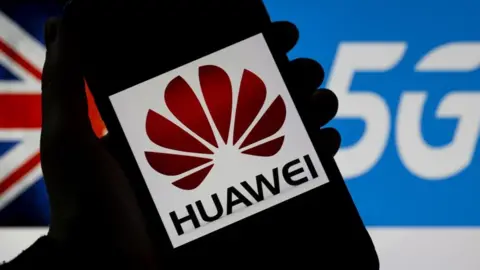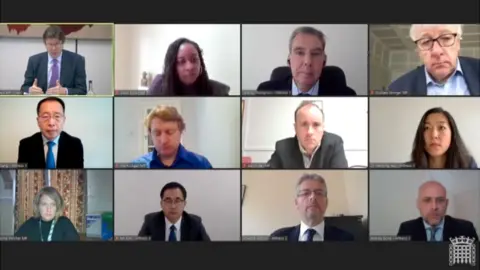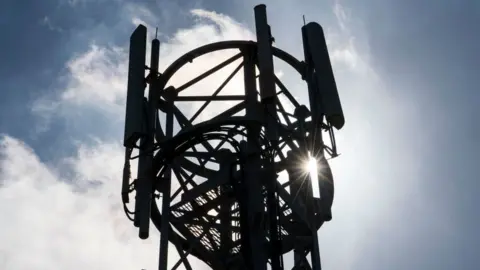'UK faces mobile blackouts if Huawei 5G ban imposed by 2023'
 Getty Images
Getty ImagesBT and Vodafone have said their UK customers would face mobile phone signal blackouts if they are given three years or less to strip Huawei's equipment out of their 5G networks.
Executives from the network providers told MPs that they wanted at least five years, and ideally seven, if such an order were made.
The government is expected to announce new curbs on the use of the Chinese firm's kit within the next two weeks.
Huawei has urged it to take more time.
"There isn't a burning bridge," said Huawei's UK vice president Jeremy Thompson, adding that it was too soon to determine what impact new US sanctions would have.
The company also denied claims it would ever act against its clients' interests, even if told to do so by the Chinese government.
 Parliament TV
Parliament TVThe Science and Technology Committee hearing represents a last chance for companies to make their cases before government ahead of a decision being taken.
'No signal'
In January, the government put a cap on Huawei's 5G market share, but decided that suggested security risks raised by allowing the Chinese firm to supply the country's telecoms providers could be managed.
Since then, however, Washington has announced fresh sanctions designed to prevent the company from having its own chips manufactured.
As a consequence, Huawei faces having to source other companies' chips for use in its equipment.
GCHQ's National Cyber Security Centre is believed to have told the Department of Digital, Culture, Media and Sport that this means it can no longer assure the security of Huawei's products.
While it now seems likely the government will opt for a ban of some sort, the question is when it will come into effect.
Some Tory backbenchers are urging a deadline to be set before the 2024 general election - and there has been speculation that it could be as soon as 2023.
But Vodafone and BT - which both use Huawei's products in their networks - said this would be hugely disruptive.
"To get to zero in a three-year period would literally mean blackouts for customers on 4G and 2G, as well as 5G, throughout the country," said Howard Watson, BT's chief technology and information officer.
He explained the logistics involved in bringing in cranes and shutting off streets to replace masts, base stations and other Huawei equipment meant that the only way to meet the timespan would be to switch over multiple sites in an area at the same time.
3G signals would not be affected as the EE network uses Nokia kit to provide that service.
Vodafone made a similar case - it uses Huawei's kit in its 2G, 3G. 4G and 5G networks.
"[Customers] would lose their signal, sometimes for a couple of days, depending on how big or how intrusive the work to be carried out is," said Andrea Dona, Vodafone UK's head of networks.
"I would say a five-year transition time would be the minimum,"
Mr Watson added: "A minimum of five years, ideally seven."
'Few more weeks'
Earlier in the hearing, Huawei made the case that it was too soon to decide on any new restrictions.
 Getty Images
Getty ImagesExecutives said that the US had yet to confirm some of the details about the sanctions, adding they would subsequently need time to see if they could mitigate the impact.
The company has built up stockpiles of its chips, and believes it could keep providing equipment based on them for some time to come.
"We can supply our customers with their orders and support the existing network with spares," said Mr Thompson.
"And in terms of who the alternative [chip] suppliers are, they're not just Chinese. There are European companies who are also in this space.
"We will be able to share those [details] with you, but that will take a few more weeks."
A spokeswoman for DCMS said she could not reveal whether the department had already handed over its recommendations to the prime minister.
Prime Minister Boris Johnson is expected to convene a meeting of the National Security Council within the coming days to discuss the possibility of a ban, which could also extend to the country's broadband infrastructure.

The warnings from Vodafone and BT about disruption to customers if Huawei is removed swiftly sound stark - but, in fact, both firms have softened their stance.
Last year they seemed determined to battle against any plan to exclude Huawei from the UK's 5G networks.
Now they seem resigned to the fact that this is going to happen.
Indeed, BT accepts that the threatened US sanctions could mean that within a couple of years, it won't be able to get hold of reliable Huawei equipment.
Their emphasis now is on timing - they want to make sure the government does not proceed as rapidly as many Conservative backbenchers would like in stripping out the Chinese firms' kit.
They understand how the political mood has changed, but will be warning ministers that disrupting mobile reception, or abandoning the target to get gigabit broadband to everyone by 2025, would also be bad politics.
